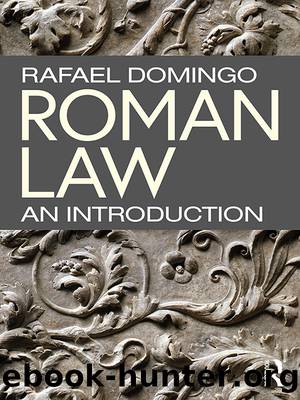Roman Law by Rafael Domingo

Author:Rafael Domingo [Domingo, Rafael]
Language: eng
Format: epub, pdf
Publisher: Taylor & Francis (CAM)
Classifications of actions
For the Romans, the primary distinction of formulae, and therefore of actions, was that of actions in rem and actions in personam. In actions in rem, the plaintiff alleged a special relation with the concrete thing he claimed. In a certain sense, the position of the defendant was secondary, and therefore the name of the defendant did not appear in the intention. His name was not required to fix the claim but was required only in the condemnation. A common case was the action for recovery of property (vindication; see formula above), which entitled the owner of an item to sue any possessor of the thing for its recovery. By contrast, in actions in personam, the plaintiff alleged that some other person was under obligation (contractual or delictual) toward him. Without the name of the defendant, it was not possible to determine the claim precisely, and therefore in the formula of personal actions, the name of the defendant had to be inserted in the intentio. A typical example was the action for a payment (condictio: see formula above).
A second important classification of actions was the division into civil actions and praetorian actions. In civil actions, the praetor granted an action whose formula already existed in civil law (rei vindicatio, condictio). Praetorian actions, in contrast, were partial or complete creations of the magistrates; therefore, they were outside the realm of civil law. There were three kinds of formulae in praetorian actions.
a Formulae with a fiction were formulae the praetor adapted by the insertion of a âpresumed understandingâ or fiction to expand the application of the civil formulae to new situations. For instance, when the praetor wanted to protect a person who was not the civil heir, he could insert the fiction, âas if he were civil heir.â The praetor could also apply civil law to foreigners under the fiction, âas if he were a Roman citizen.â
b Formulae in which the name inserted in the condemnation was different from the name inserted in the intentio occurred, for instance, in Rutilian action, created by the praetor Publius Rutilius Rufus around 118 BCE. In the formula for this action, the name of a bankrupt debtor appeared in the intentio to fix the claim, but it was the name of the purchaser of the property of the bankrupt debtor (bonorum emptor) that appeared in the condemnation, since he sued in the name of the person to whom the bankrupt debtor was in debt.
c Formulae called in factum conceptae in which there was no similarity with the formula of any action existing in civil law. The praetor could create a new formula condemning the defendant if the plaintiff proved certain factual elements described in the intentio. An example was the action for fraud (actio de dolo), introduced by the praetor Aquilius Galus in 66 BCE. Actions in factum abounded and were applied in a variety of legal relations.
Download
This site does not store any files on its server. We only index and link to content provided by other sites. Please contact the content providers to delete copyright contents if any and email us, we'll remove relevant links or contents immediately.
The European Opportunity by Felipe Fernández-Armesto(570)
The European History Highway: A Guide to Internet Resources by Dennis A. Trinkle Scott A. Merriman(535)
Morgan Kaufmann Digital Watermarking and Steganography by Ingemar Cox Matthew Miller Jeffrey Bloom Jessica Fridrich Ton(529)
The Seven Wonders of the Ancient World by Michael Denis Higgins(521)
Hyperculture by Byung-Chul Han(510)
European Security without the Soviet Union by Stuart Croft Phil Williams(508)
European Security in a Global Context by Thierry Tardy(506)
The Routledge companion to Christian ethics by D. Stephen Long Rebekah L. Miles(499)
Get Real with Storytime by Julie Dietzel-Glair & Marianne Crandall Follis(444)
Hudud Al-'Alam 'The Regions of the World' - a Persian Geography 372 A.H. (982 AD) by V. V. Minorsky & C. E. Bosworth(438)
Tibetan Studies in Comparative Perspective by Chih-yu Shih Yu-Wen Chen(436)
Gorbachev And His Generals by William C. Green(429)
Governance, Growth and Global Leadership by Espen Moe(420)
How Languages Are Learned 5th Edition by Patsy M Lightbown;Nina Spada; & Nina Spada(408)
CliffsNotes on Fitzgerald's The Great Gatsby by Kate Maurer(400)
The Oxford History of the World by Fernández-Armesto Felipe;(388)
The Egyptian Economy, 1952-2000 by Khalid Ikram(386)
Oral Poetry and Narratives from Central Arabia: The Poetry of Ad-Dindan : A Bedouin Bard in Southern Najd (Studies in Arabic Literature, Vol 17) (English and Arabic Edition) by P. M. Kupershoek P. Marcel Kurpershoek(365)
The Oxford Handbook of the Incas by Sonia Alconini(365)
